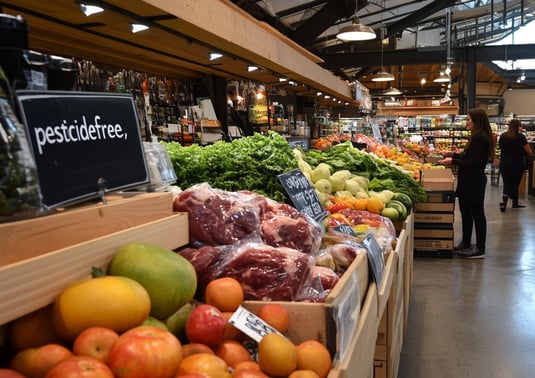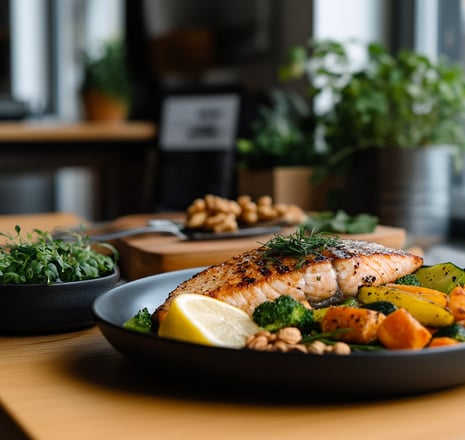
The end of “Plant-Based”?
Why clean eating Is more than just plants
For years, the plant-based movement has been hailed as the ultimate solution for health, sustainability, and longevity. And while a diet rich in vegetables, fruits, and whole foods can indeed be transformative, there’s a growing conversation that challenges the idea of plant-based as a perfect answer. Why? Because not all plants are created equal, and many come with hidden toxins, pesticides, and other risks that can harm your health.
This doesn’t mean vegetables are the enemy—it means we need to rethink how we approach plant-based eating. Clean eating, which focuses on intentional choices and food quality, offers a more balanced and sustainable solution.
Here’s what you need to know about the potential downsides of plant-based eating, the hidden dangers in your produce, and how clean eating can help you make smarter, healthier choices.
The Hidden Problem with “Plant-Based”
The term “plant-based” has become synonymous with health, but it’s often misunderstood. Just because something is plant-derived doesn’t automatically make it healthy.
Pesticides and Chemicals
Most conventionally grown fruits and vegetables are treated with pesticides to maximize yield and minimize pests. While this makes them more abundant, it also exposes you to harmful chemicals. Studies have linked long-term pesticide exposure to hormonal imbalances, fertility issues, and even an increased risk of certain cancers.
For example, leafy greens like spinach and kale are often ranked among the “dirtiest” crops, containing residue from multiple pesticides. This means that even your nutrient-packed green smoothie might be introducing toxins into your body.
Natural Plant Toxins
Many plants naturally produce toxins to protect themselves from pests. While these are usually harmless in small amounts, overconsumption can lead to issues. For instance, lectins (found in legumes and some grains) and oxalates (found in spinach and beets) can interfere with nutrient absorption or contribute to inflammation in sensitive individuals.Ultra-Processed Plant-Based Foods
Another trap of the plant-based trend is the rise of ultra-processed vegan alternatives. Meatless burgers, dairy-free cheeses, and plant-based protein bars are often loaded with refined oils, artificial additives, and fillers. While these products are marketed as healthy, they’re far from the nutrient-rich whole foods your body thrives on.
Clean Eating: A Smarter Approach
Clean eating provides a solution to these challenges by focusing on food quality and intentional choices. It’s not about cutting out plants, but about ensuring the plants (and other foods) you eat are as clean and nutrient-dense as possible.
Here’s how you can clean up your plant-based diet:
Prioritize Organic Produce
Choosing organic fruits and vegetables can dramatically reduce your exposure to harmful pesticides. The Environmental Working Group (EWG) releases an annual “Dirty Dozen” list of the most pesticide-heavy produce—use it as a guide to decide which items are worth buying organic.Wash and Prep Your Veggies
Even if you can’t buy organic, washing your produce thoroughly can help reduce pesticide residue. Use a mix of water and vinegar or a produce wash for the best results.Embrace Diversity
Instead of relying on the same few plants, diversify your diet. Eating a variety of vegetables, fruits, and other foods ensures you get a wide range of nutrients while minimizing overexposure to any single plant toxin.Go Beyond Plants
Clean eating doesn’t mean excluding animal products—it’s about being intentional with what you choose. Grass-fed meats, wild-caught fish, and pasture-raised eggs are excellent sources of nutrients like omega-3s, iron, and B12, which are harder to get from plants alone.Cook Smarter
Some plant toxins, like lectins, can be reduced or eliminated through proper cooking. Soaking, sprouting, and fermenting grains, legumes, and seeds can make them easier to digest and more nutrient-dense.
Experts Weigh In
Many health experts and doctors emphasize the importance of balance and food quality over strict dietary labels.
Dr. Mark Hyman, a leader in functional medicine, advocates for a “pegan” diet—a mix of paleo and vegan principles. He highlights that while plants should make up the majority of your plate, incorporating high-quality animal products can fill nutritional gaps and support overall health.
Meanwhile, Dr. Zach Bush, an expert in gut health and environmental toxins, warns about the impact of industrial agriculture on both human health and the planet. He encourages people to support regenerative farming practices and prioritize organic, nutrient-dense foods.
These perspectives highlight the need to move beyond labels like “plant-based” or “vegan” and focus on clean, thoughtful eating.
Practical Tips for Clean Eating
Shop Local and Seasonal
Local, seasonal produce is often fresher, more nutrient-dense, and less likely to be heavily treated with chemicals. Farmers’ markets are a great place to find high-quality options.Choose High-Quality Animal Products
If you eat animal products, opt for grass-fed, pasture-raised, or wild-caught options. These are not only better for your health but also for the environment.Limit Processed Foods
Whether plant-based or not, processed foods often contain additives, preservatives, and unhealthy oils. Focus on whole, minimally processed ingredients instead.Focus on Soil Health
Support brands and farms that practice regenerative agriculture, which prioritizes soil health and minimizes the use of synthetic chemicals.Grow Your Own
If possible, growing your own vegetables and herbs ensures they’re free of pesticides and as fresh as they come. Even a small garden or windowsill setup can make a big difference.
Final Thoughts
The end of “plant-based” doesn’t mean the end of eating plants—it means the end of blindly assuming all plants are good for you. By embracing clean eating, you can enjoy the benefits of a plant-forward diet without exposing yourself to unnecessary toxins and risks.
This balanced, intentional approach doesn’t require perfection. It’s about making small, informed changes that prioritize your health and well-being. So wash your veggies, choose organic when you can, and don’t be afraid to include high-quality animal products in your diet.
Because longevity and vitality don’t come from following trends—they come from thoughtful, intentional choices that truly nourish your body.
The end of “Plant-Based”?
This doesn’t mean vegetables are the enemy—it means we need to rethink how we approach plant-based eating. Clean eating, which focuses on intentional choices and food quality, offers a more balanced and sustainable solution.





